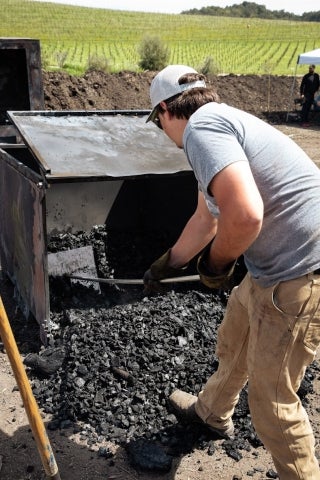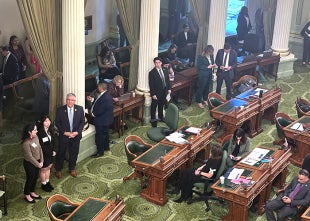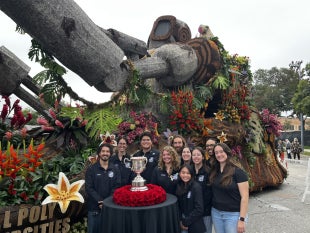Cal Poly Receives $1.9 Million for Climate Action Initiatives as Part of $80 Million State Funding Plan
Nick Wilson
805-235-8008; nwilso28@calpoly.edu
AnnMarie Cornejo
805-756-2427; ancornej@calpoly.edu
University efforts include research to assist ranchers and farmers by developing climate-smart agricultural techniques and providing eco-friendly equipment
SAN LUIS OBISPO — As part of an $80 million state grant program to address climate change, Cal Poly project teams have been awarded nearly $2 million for two projects to reduce carbon emissions, improve resource management and advance long-term, sustainable agricultural practices.

Cal Poly’s Initiative for Climate Leadership and Resilience, or ICLR, received nearly $1.76 million, while the College of Agriculture, Food and Environmental Sciences was awarded about $183,000, both through a historic partnership between the University of California and the state of California that was announced in late August.
The California Climate Action Seed Grants and Matching Grants will award more than $80 million in climate action grants to support 38 projects involving more than 130 community, industry, tribal and public agencies, as well as a dozen University of California (UC) locations, Cal Poly and 10 other California State University (CSU) campuses and two private universities.
The 23-campus CSU, with its nearly 460,000 students, is the nation’s largest and most diverse four-year public university. The UC system has 10 campuses, six academic health centers and helps oversee three national labs for the U.S. Department of Energy.
“The innovations catalyzed by the Climate Action awards will make all of our communities safer, more sustainable and more resilient,” said UC President Michael V. Drake. “I am grateful to the state Legislature and Gov. Newsom for providing funding to support this critical research on climate change in California.”
The seed and matching grant projects aim to mitigate wildfire risks, combat soil degradation and erosion, address water management throughout the Golden State and create land stewardship partnerships led by Indigenous communities. Seed grants totaling $56.2 million were awarded to 34 teams. Four teams received matching grants, valued at nearly $27 million, to support larger projects that could leverage additional funding from non-state sources. Those funds are part of $185 million allocated by the state for UC initiatives advancing progress toward California’s climate goals.
“With these investments, California is harnessing the ingenuity of our world-renowned universities and people to deliver climate action across our state,” said Gov. Gavin Newsom. “California is leading the charge in tapping our natural resources to protect our people, our communities, and our planet.”
Among the awards earmarked for Cal Poly, the ICLR, which works to create a future workforce that can produce climate solutions, will use $1.76 million to implement strategies around sustainable land use and agricultural farming techniques. Farm operators, California Resource Conservation Districts and the university will collaborate toward sequestering carbon, reducing water consumption, decreasing fertilizer use/runoff, increasing economic yield and making farms more resilient to climate change.
“This funding will help provide effective strategies, tools, education and support toward achieving long-lasting benefits for our climate, crop production and the sustainability of our land,” said ICLR Director Erin Pearse (pictured at top). “Agriculture has the unique potential to be not just carbon-neutral, but actually carbon-negative, by removing carbon from the atmosphere — and much more economically and much more safely than anything mechanical.”
The program will provide farmers with the materials needed for climate-smart agriculture, an integrated approach to managing cropland, livestock, forests and fisheries to address the challenges of food security and climate change. These include: compost; biochar; cover crops; and specialized equipment to implement these materials. The Cal Poly faculty-student team will introduce farmers to these methods and partnering with existing practitioners to develop and broadly share knowledge and practice methods.
Climate-smart agriculture has many benefits. In addition to increasing crop yields, these practices decrease emissions and erosion, increase organic matter in soil, retain water and reduce water needs, and reduce fertilizer and pesticide use (and runoff), while sequestering carbon from the atmosphere.

Photo courtesy of Erin Pearse
The two-year grant, which will run indefinitely pending further funding, will involve three Cal Poly colleges and dozens of students and faculty. Cal Poly’s program also will seek to partner with other state universities and organizations to help grow and expand the grant program.
Farmers and ranchers will directly benefit by the research. In addition to professional development, Pearse said benefits include: direct funding support, as well as access to leasing expensive equipment, such as a biochar kiln (making nutrient-rich charcoal from organic waste), at negligible fees and guidance with streamlined permitting.
“We have two faculty from agribusiness who are going to be doing case studies to determine economic benefits, like crop yields, but also the benefits that come from not having to do permitting and all those indirect costs and externalities,” he said. “This program is designed to grow and scale, and I’m so excited about the educational side of sharing techniques, monitoring and equipment that will help advance farming, both economically and environmentally.”
Students from across the campus will participate as researchers, collaborators and through course work that will help design and implement effective sustainability models.
The second Cal Poly grant will provide $183,000 for research focused on establishing drought resilient grassland restoration networks throughout California. Cal Poly Assistant Professor Yamina Pressler, a soil ecologist in the Natural Resources Management and Environmental Sciences Department, will work with faculty at Cal State Polytechnic University in Humboldt on the effort.
“The project aims to promote biodiversity restoration in California grasslands by initiating a resource and seed sharing network, evaluating trait-based restoration, and creating a climate-smart toolkit for restoration practitioners,” Pressler said.
It also will provide Learn by Doing opportunities for Cal Poly students in field and laboratory research settings. Students will be involved in conducting ecological assessments of coastal grasslands, evaluating plant roots traits, collecting soil samples and quantifying soil metrics. “These efforts will contribute to the development of a climate-smart toolbox for restoration practitioners,” she said
These projects will help the state weather the shifts in temperatures and weather patterns that are affecting residents in a variety of ways, including ability to grow food, housing and safety.
“The persistent climate challenges faced by California have put the state in ‘code red’ emergency status,” said Theresa Maldonado, UC vice president for research and innovation. “Making California truly resilient requires thoughtful partnerships and full engagement of every sector of society. These awards reflect the brain trust and united voices across the state to achieve collective impact.”



